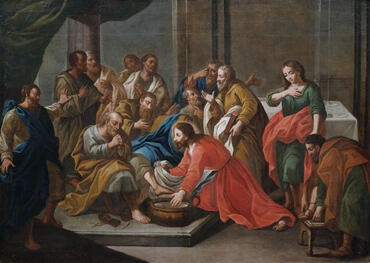13
Which were born, not of blood, nor of the will of the flesh, nor of the will of man, but of God.
13
Which were born, not of blood, nor of the will of the flesh, nor of the will of man, but of God.
By Brian David

John 1:12 talks about people receiving the Lord and being reborn with pure hearts and living as angels. This verse shows where such acceptance and life must come from – first by showing where they do not come from.
"Blood" here means a desire to deny and resist what the Lord teaches, in the Bible and in earlier forms of His Word. "The will of the flesh" means a craving for selfishness and evil. "The will of man" means the false reasoning that erupts from selfishness and justifies it. If we allow our eternal selves to be born of those things – denying the Lord’s leadership, serving ourselves and justifying it in our own minds – we will end up in hell. But if our eternal selves are born "of God," under His leadership and serving His will, then we will be the sons of God described in the previous verse, living in peace and joy in heaven.
(References: Arcana Coelestia 1608 [2], 2531 [4], 8409 [3], 9241, 9454; Teachings about the Lord 18 [5]; The Apocalypse Explained 151 [5], 745 [4])
51. The following passages support what has been said thus far:
Good people out of the good treasure of their hearts bring forth what is good; evil people out of the evil treasure of their hearts bring forth what is evil. Out of the abundance of the heart the mouth speaks. (Luke 6:45; Matthew 12:35)
In the Word, the heart means our will, and since this is the source of our thinking and speaking, it says that "out of the abundance of the heart the mouth speaks."
It is not what goes into the mouth that makes people unclean but what comes out of the heart; this is what makes people unclean. (Matthew 15:11)
Again, the heart means our will. And Jesus said of the woman who had washed his feet with anointing oil that her sins were forgiven because she loved greatly; and later added, "Your faith is saving you" (Luke 7:46-50).
We can see from these words that when our sins are forgiven - that is, when they are no longer there - our faith saves us.
In John 1:12-13 the Lord tells us that people are called "children of God" and "born of God" when their will is not full of a sense of self-importance and their understanding is therefore not clouded by that same sense of self-importance - that is, when they are not focused on what is evil and therefore on what is false. He also teaches us there that such people are the ones who believe in the Lord. For an explanation of these verses see the end of 17 above.